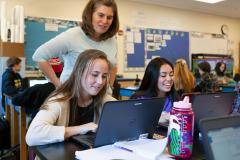All ODI Resources
Our work is organized in two main strands:
- K-16: transforming K-16 classrooms through the integration of data skills into STEM teaching and learning. View K-16 Projects | Resources.
- Workforce Preparation: working with community colleges, big data industry experts, and career and technical educators, to help prepare students and early career professionals to succeed in the big data world. View Workforce Prep Projects | Resources.
View our full list of ODI Resources below:
| Type | Title |
|---|---|
|
Presentation Thoughts on Data Sharing in Geosciences The Spatial Intelligence & Learning Center convened a small, focused workshop to contemplate the benefits and challenges of establishing a national data archive and data sharing infrastructure for spatial cognition data and associated education data. |
|
|
Curriculum Ocean Tracks: High School Learning Modules Supporting students' work with authentic data requires a carefully developed and rigorously-tested curriculum to help them understand what the data represent, and to guide them in how to use data analysis tools and visualizations to identify meaningful patterns and develop evidence-based hypothes |
|
|
Scientific Publication Analysis of Spatial Concepts, Spatial Skills and Spatial Representations in New York State Regents Earth Science Examinations Research has shown that spatial thinking is important in science in general, and in Earth Science in particular, and that performance on spatially demanding tasks can be fostered through instruction. Because spatial thinking is rarely taught explicitly in the U.S... |
|
|
White Paper The Relationship Between Direct and Data-Mediated Knowledge of the World About 20 years ago, psychologist Lynn Liben presented an model of the relationships among a learner, an external (i.e. not mental) representation, and those aspects of the real world represented by the representation (the “referent”). |
|
|
White Paper Pervasive and Persistent Understandings about Data This paper describes our current thinking on pervasive and persistent understandings about data |
|
|
Presentation Visualizing Oceans of Data: Using learning research to inform the design of student interfaces to climate data Presentation at American Geophysical Union Conference in San Francisco, December 2013 |
|
|
Presentation Preparing High School Students for College and the World of Big Data Keynote Address, IBM's Big Data and Analytics EdCon 2013, November 2, Las Vegas |
|
|
Presentation What Do Geoscience Novices Look at and What Do They See When Viewing and Interpreting Data Visualizations? This poster presented the first results from Principal Scientist Kim Kastens’ collaborative grant on “Making Meaning from Geoscience Data: A Challenge at the Intersection between Geosciences and Cognitive Sciences.” ... |
|
|
Interface/Tool Ocean Tracks Interface This program is developing and classroom testing a Web interface and data analysis tools that engage students in scientific investigations using data from the Tagging of Pacific Predators (TOPP) Program, NOAA’s Drifter Program, and the National Center for Ecological Analysis and Synthesis. |
|
|
Book Visualizing Oceans of Data: Educational Interface Design Large, high-quality online scientific datasets give today’s students the opportunity to work with authentic data and participate in real scientific work. Yet the educational promise of these datasets will not be met without concerted effort. |
|
|
Report Visualizing Oceans of Data: Educational Interface Design Large, high-quality online scientific datasets give today’s students the opportunity to work with authentic data and participate in real scientific work. Yet the educational promise of these datasets will not be met without concerted effort. |
|
|
Essay What precursor understandings underlie the ability to make meaning from data? (June 2013) Young children have the ability to reconstruct events based on the traces left behind by those events. Would nurturing this ability help them make meaning from data they did not collect themselves?... |
|
|
Curriculum Other Worlds/Other Earths Curriculum Activities EDC worked with the Harvard Smithsonian Center for Astrophysics to create an engaging set of curriculum activities that involve students in using data encoded in the light from distant stars to search for exoplanets and possible life beyond Earth. |
|
|
Interface/Tool The Common Online Data Analysis Platform (CODAP) In collaboration with Concord Consortium and the University of Minnesota, EDC's Oceans of Data Institute is developing and classroom-testing an online, open-source data analysis platform that can be used in conjunction with a variety of data types and curricula. |
|
|
Interface/Tool Data-Enhanced Investigations in Climate Change Education (DICCE) The project team has developed supports to allow high school teachers and students to access and use climate-related data from the Goddard Interactive Online Visualization and Analysis Intrastructure (GIOVANNI) data portal. |



